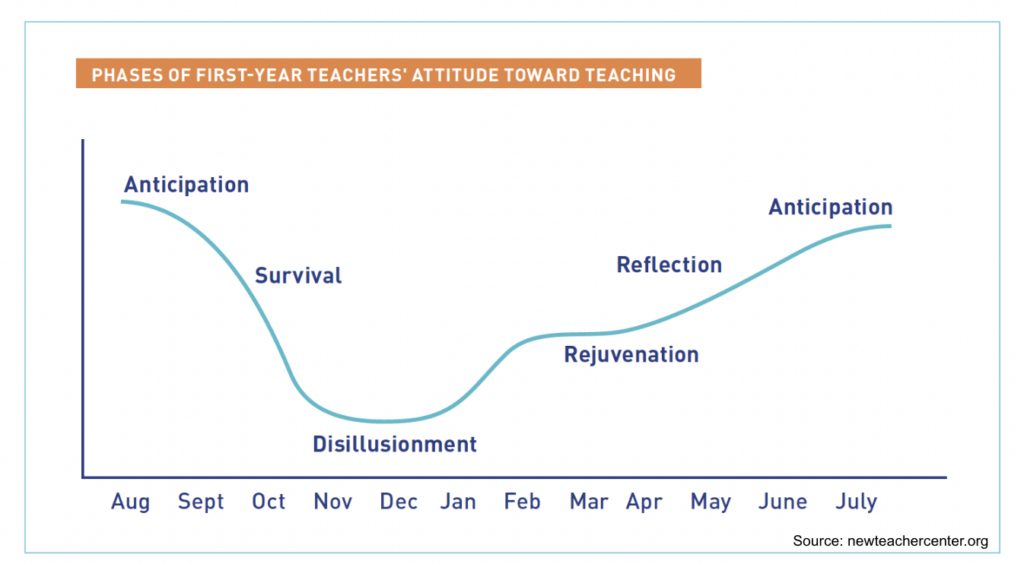We recognize recruitment, new teacher attrition, and teacher retention are major issues for districts and organizations across the country. These issues inspired our webinar Tips for Supporting and Retaining Your New Teachers. Within the presentation, our panel of three educators discussed the best ways to support, develop, elevate, and retain new teachers, improving outcomes for all educational stakeholders.
We are committed to continuing to help you help your new teachers thrive in the classroom. During the webinar, several of you asked excellent questions and during the quick hour, we only had time to address a handful of them. Below you will find the rest of your questions answered.
How can I give a realistic view of our profession without scaring my student teachers?
Video works well for this, so they can see and hear good teaching in a classroom setting. Additionally, having a conversation about teaching as a professional practice can help level set expectations. You could also share the “roller coaster” graphic (seen below) with them and ask them to brainstorm reasons for the dip and potential solutions.
How do you think the atmosphere of relentless testing has affected our candidates who are entering teaching after being taught to the test (explicitly or implicitly) for their entire academic career? What kind of effect do you think testing culture has had on incoming teachers? They were educated in a system steeped in that culture. Has that failed to prepare them?
There is always an opportunity to skill-build with new teachers. Some may require professional learning and support around communication, some with solving challenges on the fly, and others with planning. They may have a solid understanding of the pedagogy from their studies, but applying methods in real life and then reflecting may be new.
Is it during the trough that teachers decide to leave the profession?

Interestingly enough, we’ve not seen data on when, during the year, these teachers are making the decision. This would be much easier to track, identify, and assist with monthly new teacher surveys.
This upcoming year will be my first as a district-level instructional coach — I’ll be working with all new 6th-12th ELA teachers across 16 different schools. What’s the one best piece of advice you can give me to best support these teachers?
Keep tabs on where each candidate is professionally and personally (specific to wellbeing as a teacher). Then, try to personalize your coaching to them, meeting the new teacher, where they are, through an individual coaching plan.
What is the retention of information with the bite size approach?
The Secret Behind: How Microlearning Boosts Knowledge Retention by at least 50%
Can you share the link(s) to the latest research on supporting new teachers?
Here is a list of resources Teaching Channel has used to support the creation of EQUIP.
When you talk about observation, is that tied to evaluation or non-evaluative observation between the mentor and mentee?
Feroze Munshi, an instructional coach from Oakland Unified School District answered: “This is very specific to my role (and something I really value about my role) but I cannot evaluate teachers because I am technically a teacher and there are rules in place that prevent teachers from performing evaluations on other teachers. That said, I prefer non-evaluative feedback because there is of course a very real ‘evaluative threat’ that can lead to some performative behaviors and reflections. In my experience, I find that evaluation shifts the incentive away from a critical, reflective stance towards a more defensive stance.”
How are districts getting the funding to do this level of support?
According to the Association for Supervision and Curriculum Development (ASCD), coaches are typically funded in three ways:
- a coach is hired as a teacher
- a coach may be supported by reallocating funds for professional development
- or a coach may be hired through external federal or state funding sources.
Did your sessions take place after school?
Feroze tries to coach during a teacher’s prep period but does coach some teachers after school. It depends on the teacher and their schedules.
Shouldn’t your grade level leaders be involved with mentoring your new teachers as well? Where do they fit?
They can certainly act as a mentor and instructional leader by checking in with new teachers on a regular basis. They may be a trusted source for the new teacher who could, perhaps, share video of instruction for peer feedback. Grade-level leaders can be quite impactful in creating school culture and welcoming new teachers into the fold.
How are you addressing new teachers’ use of social media? There is bleed over between personal and professional use of social media.
How much time per week is appropriate for new teacher support?
Frequency is more important than length of time and it should vary based on the needs of the new teacher. Keely Keller, the creator and facilitator of EQUIP for New Teachers, recommend a touch point a week with a mentor, at minimum. Monthly meetings with all new teachers is a good practice. Instructional coaching per the district requirements and the individual teacher needs.
What is the first resource instructional leaders can provide new teachers?
A checklist of “to-do’s” before students arrive w/ associated resources including a mentor or co-teaching connection.
How can districts support career changers?
Career changers can bring professionalism, communication skills, tech abilities, etc. It’s important to encourage them to use the skills and strengths they have, but they also must begin to think about topics, concepts, skills, etc. through an educational lens: student, families, leaders, community members, etc.
How can you get started using video with new teachers?
See the micro-teaching video coaching handout included in the participant files, and check out our video coaching platform, ENGAGE Feedback.
Is the EQUIP program available for purchase?
EQUIP for New Teachers can be purchased individually by educators or by organizations.
What methods can be used to make asynchronous learning engaging and enjoyable?
Vary the activities you give new teachers, use video to have in-depth conversation about specific components of instruction, encourage the use of video for new teacher self-reflection, and provide opportunities for movement, collaboration, and the use of media/technology.
Interested in supporting your new teachers fully? Check out Equip for New Teachers, a packaged, plug-and-play, program that stands on its own or bolsters your existing induction program.







